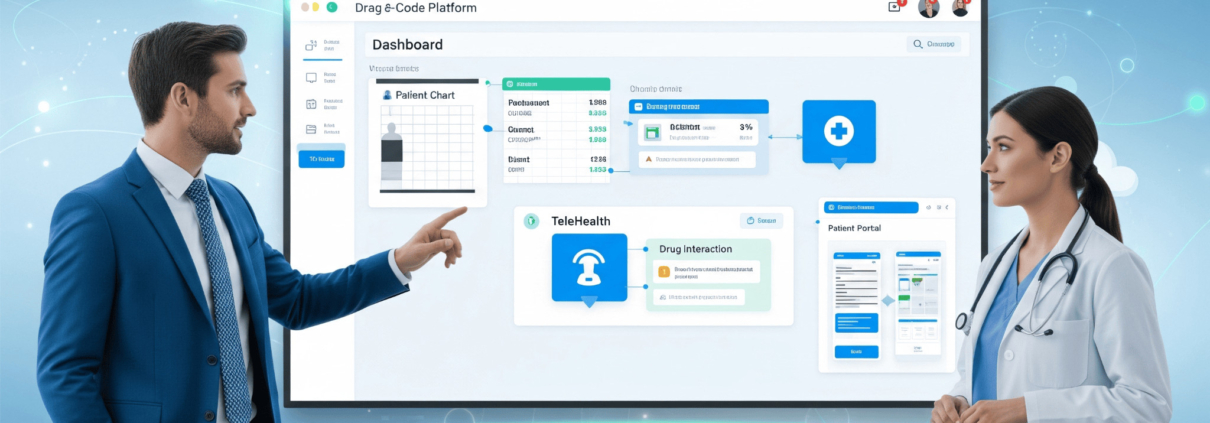The Future of Healthcare IT Consulting: Blending Strategy with Low-Code Agility
Healthcare organizations today face an unprecedented challenge: they must deliver superior patient care, maintain strict regulatory compliance, and modernize legacy systems-all while controlling escalating costs. Traditional IT approaches often can’t keep pace with the rapid changes reshaping healthcare delivery.
Enter a powerful combination transforming the industry: strategic healthcare it consulting services paired with low-code development platforms. This partnership enables hospitals, clinics, and healthcare startups to build intelligent, secure digital solutions in weeks rather than months, while ensuring alignment with long-term organizational goals.
The Growing Urgency for Healthcare IT Transformation
Modern healthcare faces a perfect storm of technological challenges:
- Legacy System Constraints: Many organizations rely on outdated EHR and EMR systems that resist integration, creating data silos that hinder care coordination.
- Regulatory Complexity: Compliance with HIPAA, HL7 FHIR standards, and healthcare regulations requires specialized expertise and constant vigilance.
- Cybersecurity Threats: Healthcare data breaches increased by 32% in 2024, making robust security architecture critical.
- Patient Expectations: Today’s patients expect seamless digital experiences-from telehealth consultations to mobile health monitoring and instant access to medical records.
healthcare it consulting services address these challenges by providing specialized expertise in medical workflows, regulatory requirements, and technology integration. Experienced consultants serve as strategic advisors, helping organizations navigate the complex intersection of healthcare delivery and technology innovation.
Low-Code Development: Healthcare’s Innovation Accelerator
Low-code platforms represent a paradigm shift in application development. These visual environments enable teams to create sophisticated applications using drag-and-drop interfaces, pre-built components, and minimal traditional coding.
For healthcare organizations, low-code solutions offer compelling advantages:
- Accelerated Development: Applications that traditionally took 6-12 months can now be delivered in 4-8 weeks
- Resource Efficiency: Clinical staff can collaborate directly with IT teams, reducing miscommunication
- Compliance Built-In: Leading platforms include HIPAA-compliant templates and security controls
- Cost Effectiveness: Organizations typically see 50-70% reduction in development costs
- Rapid Iteration: Changes can be implemented quickly based on user feedback and clinical needs
The Strategic Partnership: Consulting Expertise & Low-Code Agility
When strategic consulting combines with low code development services capabilities, healthcare organizations unlock unprecedented innovation potential:
Strategic Foundation: IT consultants conduct comprehensive assessments, identify gaps, and develop roadmaps that align technology initiatives with clinical objectives.
Rapid Execution: Low-code platforms translate strategic recommendations into working applications, enabling rapid prototyping and iterative development.
Compliance Assurance: Consultants ensure rapidly developed solutions meet all regulatory requirements and industry standards.
Consider this scenario: A regional health system needed to improve care coordination across multiple facilities. Traditional development would have required 18 months. Instead, consultants designed the integration strategy while low-code developers built custom dashboards in just 10 weeks-resulting in improved patient outcomes and $2.3M in annual operational savings.
Transformative Benefits for Healthcare Organizations
The synergy between strategic consulting and low-code development delivers measurable advantages:
Speed and Cost Optimization
Healthcare organizations using this approach report 60% faster time-to-market for new applications and 40-50% lower costs compared to traditional development.
Enhanced Compliance and Scalability
Strategic oversight ensures rapidly developed solutions meet HIPAA and regulatory requirements from day one, while enabling quick scaling across departments without massive infrastructure investments.
Improved User Adoption
Because clinical staff participate directly in development, applications are more intuitive and see adoption rates often exceeding 85% within the first month.
Real-World Applications Transforming Care
Remote Patient Monitoring
A large cardiology practice created a comprehensive RPM platform integrating with wearable devices, automatically alerting clinicians to concerning vitals. The solution reduced readmissions by 23% while improving patient satisfaction.
Telehealth Integration
A rural health network implemented a custom telehealth solution seamlessly integrating with their existing EHR system, supporting over 10,000 virtual visits across 15 clinics in six months.
Clinical Analytics
Consultants helped a health system identify sepsis prevention KPIs while low-code developers created real-time dashboards with alerts and trend analysis, contributing to a 35% reduction in sepsis-related mortality.
Administrative Automation
A multi-specialty group automated prior authorization processes, reducing processing time from 72 hours to 4 hours and improving staff efficiency by 300%.
Navigating Implementation Challenges
Successful implementation requires careful planning:
Change Management: Clinical staff may resist new technologies. Success requires comprehensive training, clear benefit communication, and strong leadership support.
Platform Selection: Key evaluation criteria include HIPAA compliance, integration capabilities with major EHR systems (Epic, Cerner, Allscripts), scalability, and vendor healthcare expertise.
Governance Framework: Rapid development capabilities require strong governance to ensure consistency, security, and compliance across applications.
Best Practices for Success
Start with Strategy: Engage experienced healthcare IT consultants to assess current state and develop comprehensive roadmaps.
Choose Proven Partners: Select consulting firms with deep healthcare expertise and low-code platforms with strong healthcare track records.
Involve End Users: Include clinicians and administrators in the design process from day one.
Maintain Security Focus: Implement robust security measures, regular audits, and comprehensive staff training on data protection.
Measure and Optimize: Establish clear success metrics and continuously optimize based on user feedback and performance data.
The Road Ahead: Healthcare IT in 2025 and Beyond
The future of healthcare IT will be characterized by increased agility, patient-centricity, and innovation. Organizations embracing the strategic consulting and low-code partnership will be positioned to:
- Accelerate Digital Health: From AI-powered clinical decision support to IoT-enabled monitoring, rapid development enables faster innovation cycles
- Enhance Interoperability: Simplified integration solutions connecting disparate systems for seamless data exchange
- Improve Patient Engagement: Custom applications providing personalized experiences that improve outcomes
- Support Value-Based Care: Flexible analytics tools providing real-time insights into quality metrics and cost performance
Conclusion
The healthcare industry stands at a critical juncture. Organizations that continue relying on slow, traditional IT approaches risk falling behind in an increasingly competitive environment. Those embracing strategic consulting and low-code development will thrive.
This partnership offers more than technical solutions-it provides a transformation pathway that balances innovation with compliance, speed with security, and technology advancement with patient-centered care.
The question isn’t whether your organization will eventually adopt this approach, but how quickly you can begin the journey. The future of healthcare depends on organizations that can adapt quickly, innovate continuously, and keep patient outcomes at the center of every technology decision.
At DreamSoft4U, we specialize in combining strategic healthcare it consulting services with cutting-edge low-code development solutions. Our experienced team understands the unique challenges facing healthcare organizations and delivers tailored solutions that drive measurable results while ensuring full regulatory compliance.
Ready to explore how strategic consulting and low-code development can transform your healthcare organization? The time for incremental change has passed-the future demands bold action and innovative thinking.










Leave a Reply
Want to join the discussion?Feel free to contribute!